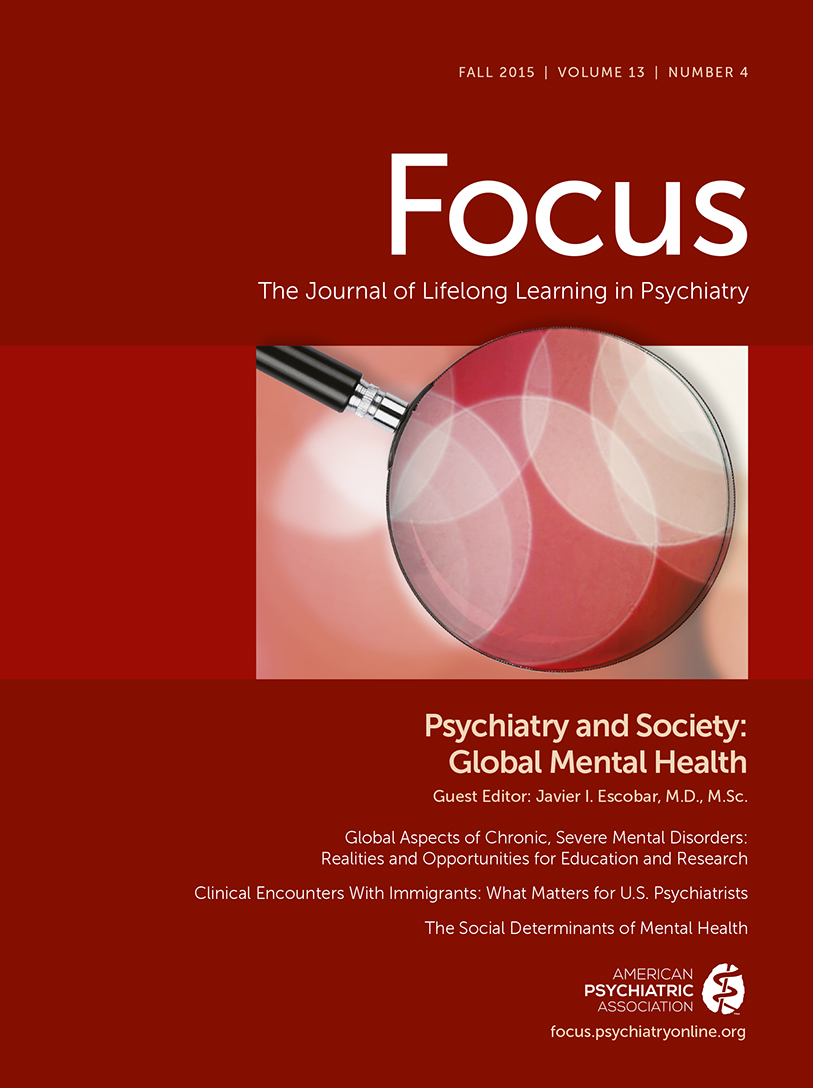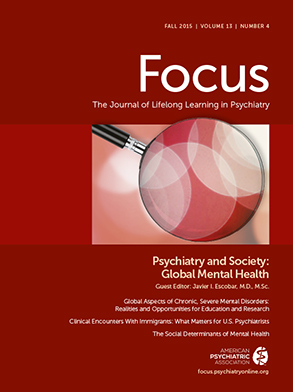The adage “Global is local and local is global” also applies to mental health. We are in a global era, and global mental health has made a relatively late entry into this field. It substantially lags behind global health and behind many other sciences and technologies. Therefore, profiling global mental health in this issue of Focus is quite timely. The field of global health has acquired significant visibility in the past decade, with academic, governmental, and private institutions strongly endorsing this multidisciplinary perspective, which includes targeting health problems and health care issues that transcend national boundaries and can be addressed cooperatively. Global mental health follows the same principles as global health but remains an “orphan” field, at least from the perspective of research support and universal implementation of effective interventions.
Thanks to initiatives spearheaded by the World Health Organization and the National Institute of Mental Health, a number of international programs in global mental health have been created, with the main goals of increasing awareness of mental health problems and providing cost-effective interventions that use local resources, rather than relying on a cadre of trained mental health specialists. These initiatives have taken place primarily in low- and middle-income countries and rely on primary care more than specialty care, often using nonphysician health extenders. These practical and cost-effective interventions also can be applied in high-income countries such as the United States. In fact, given the poor integration of care, the needs of many communities, and the shortage of specialized mental health professionals in this country, many of these interventions should be quickly implemented.
Indeed, many U.S. communities have become “global villages,” as is the case with my own university town of New Brunswick, New Jersey, a town with approximately 55,000 inhabitants and home to Rutgers University. New Brunswick has a large racial-ethnic minority population, most of whom are recent immigrants from Latin America, Southeast Asia, and Eastern European countries and speak a variety of languages, with most (approximately 60%) being non-English speakers. Assessing mental health issues and providing appropriate care to these populations are real challenges, given issues of access to care, availability of services, and financial problems. Thus, similarly to what happens in other cities and regions of the United States, access to mental health care is a problem for many residents of New Brunswick, particularly those from racial-ethnic minority groups. Proper delivery of general health care to these diverse groups is another challenge, and the lack of integration of behavioral and primary care services coupled with the unfortunate socioeconomic realities makes matters worse. Therefore, mental health services are lacking for many, and the little care provided largely takes place in primary care and emergency room settings. Thus, the above adage is fitting: lessons learned in local communities around the world can be applied at many sites in the United States.
With his Partners in Health (PIH) initiative, Paul Farmer, one of the leading global health figures, first targeted poverty-stricken regions outside the United States, such as the Haitian community of Cange. PIH developed an admirable set of effective interventions and activated philanthropic channels. Interestingly, the Partners in Care framework has been expanded beyond Haiti into several other areas in need, including some impoverished U.S. communities (PIH/Community Outreach and Patient Empowerment program in the Navajo nation of the Southwest and the PIH/Prevention and Access to Care and Treatment program in Boston).
The articles included in this issue of Focus provide useful and timely information that helps shape the various pieces of the growing global mental health puzzle.
The review of social determinants of health by Compton and Shim outlines a useful model to understand the impact of poverty and discrimination and their interaction with obstacles to accessing health services that affect many populations in the United States and the rest of the world. Although the word global does not come up in their review, their model provides an important theoretical perspective and serves as a starting point for effective interventions cognizant of context and culture.
To provide students and future practitioners in the global health field with a global perspective, conveying the relevance of global health exposure, global education, and research into global matters is crucial. Supervised exposure that enhances clinical skills and changes the world perceptions of the students cannot be emphasized strongly enough and should be incorporated into medical school curricula. In this issue of Focus, Mark Sedler, M.D., a psychiatrist who leads global medical education at Stony Brook School of Medicine, addresses this issue from the perspective of U.S. medical schools by providing some examples of meaningful international projects done by medical students—experiences that have a long-lasting impact on the students and that invariably win them to the cause of global mental health.
The local focus on chronic, severe mental disorders, which uses available resources and capitalizes on the enthusiasm and collaboration of U.S. and local professionals to identify individuals in need and implement interventions, is illustrated by the work of Gabriel de Erausquin and his team of collaborators from the United States, Argentina, and Peru. In this important work with a special population of the Andean mountains, the team trained health agents to locate affected individuals and implement needed interventions. The sophisticated research design and methodologies that were applied locally in this instance should have important repercussions for mainstream psychiatry in the United States and the rest of the world. In their article in this issue of Focus, de Erausquin and his team show the relevance of parkinsonian symptom assessment and echogenicity of the substantia nigra, a marker of dopaminergic neuronal loss, for secondary prevention for patients with schizophrenia.
The blurring of frontiers and the massive immigration waves from rural to urban areas and from low-income to middle- and high-income countries are phenomena seen worldwide. This important topic of immigration is covered by Hausmann-Stabile and Guarnaccia, the latter a professor at Rutgers University, whose research has focused on immigrant groups to New Brunswick, New Jersey, particularly those coming from the Oaxaca region of Mexico.
Immigrants are often isolated, discriminated against, and disadvantaged; therefore, the provision of culturally congruent health services to these groups is the exception, rather than the rule. However, despite migration being a brutal and painful process for many, it also has its positive side, and immigrants add new energy and color to stagnant societies.
Finally, the contribution by Aggarwal and Lewis-Fernández provides theoretical and practical aspects for using the Cultural Formulation Interview now included in DSM-5, which is quite relevant for today’s practice and should be encouraged for local and global work on mental health.
More than advancing science per se, the emerging field of global mental health has focused on improving recognition of mental disorders and facilitating mental health interventions that involve international collaborations and use community resources. From this perspective, mental and behavioral problems cannot be disentangled from primary care and are deeply affected by socioeconomic realities.

